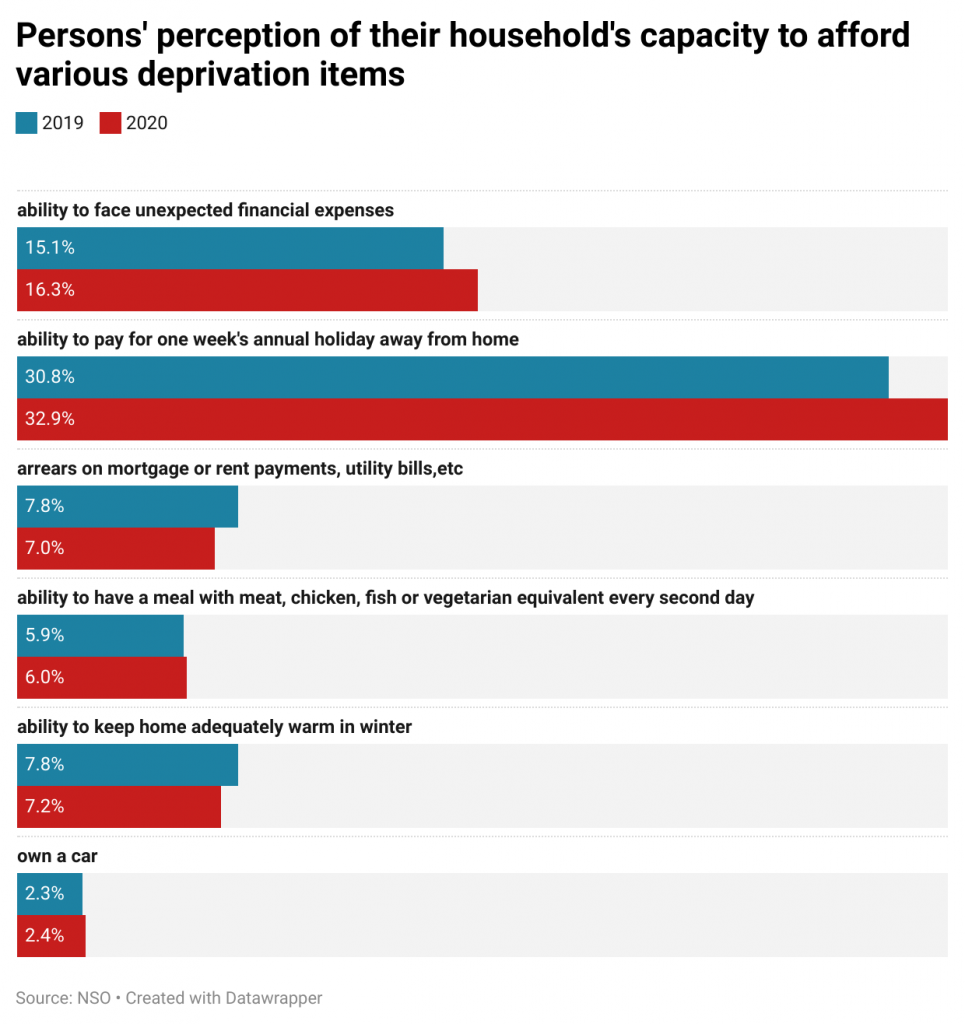A third could not afford holiday in 2020, a sixth unable to sustain a sudden expense

In 2020, a third of the Maltese population could not afford a week-long holiday while one in every six had no financial means to cover a sudden expense in excess of €740. The figures represent a slight increase when compared to the respective figures for 2019 and are further testament to concerns that the robust economic growth registered prior to the COVID-19 outbreak, did not trickle down to all levels of society.
These indicators emerge from an annual study published by the National Statistics Office which looks into trends on income and living conditions among persons living in private households in Malta and Gozo.
It transpires that last year 32.9% of the population, which translates to 166,210 persons, could not afford to pay for one week’s annual holiday away from home. Compared to 2019, this marks an increase of 16,700 persons which represents a rise of 2.1 percentage points.
As for the financial means to cope with an unexpected financial expense – defined as anything from €740 upwards – the NSO said that in 2020 there were 82,169 persons who said they could not afford such expenditure. These people accounted to 16.3% of the population, which is 1.2 percentage points higher than in 2019 when the respective figure was of 73,272 persons.
These two indicators are among a set of nine established at European level as the most relevant components to measure material deprivation, which as one of the forms to evaluate whether somebody is in poverty or not. Anybody living in a household which cannot afford at least three of these nine indicators is categorized as materially deprived, and severely materially deprived if they cannot afford four of these indicators.
What are these nine key indicators?
- ability to face unexpected financial expenses (€740 and over)
- whether they have been in arrears on mortgage or rent payments, utility bills, hire purchase instalments or other loan payments
- ability to keep home adequately warm in winter
- ability to pay for one week’s annual holiday away from home
- ability to have a meal with meat, chicken, fish or vegetarian equivalent every second day
- own a washing machine
- own a colour TV
- own a telephone (including mobile phone)
- own a car
The table below compares the percentages of those unable to meet some of the key indicators in 2019 and 2019 respectively.
What is the overall situation?
It transpires that in 2020, 43,733 persons declared they could not afford three of the above indicators, meaning they were materially deprived. This represented 8.7% of the population, and a marginal 0.3 percentage point increase over 2019.
On the other hand, those categorised as severely materially deprived declined by 0.3 percentage points over 2019. Consequently, in 2020 there were 16,636 persons in severe material deprivation (3.3%) when compared to 17,506 in 2019.
Secondary indicators
The study also takes a snapshot of Malta’s standard of living through a set of secondary indicators. Last year, 2.3% of the population or 9,958 persons who could not afford an internet connection at home which was became an essential tool for essential services such as education after the outbreak of the pandemic. Of particular concern is the fact that there was an increase of 1,005 persons who could not afford such means of communication when compared to 2019.
Other notable trends recorded in 2020 when compared to 2019 are the following:
- 22,963 (5.4%) could not afford to replace worn-out clothes by some new – an increase of 4,354 persons (0.8 percentage points)
- 23,770 (5.6%) could not afford two pairs of properly fitting shoes – an increase of 4,971 persons (1 percentage point)
- 31,481 (7.4%) could not afford a get-together with friends for a drink/meal at least once a month – a decline of 785 persons (0.5 percentage points)
- 46,475 (10.9%) could not afford to regularly participate in leisure activity – a decline of 9,049 (2.7 percentage points)
- 47,611 (11.2%) could not afford to spend a small amount of money each week for themselves – a decline of 0.8 percentage points.
